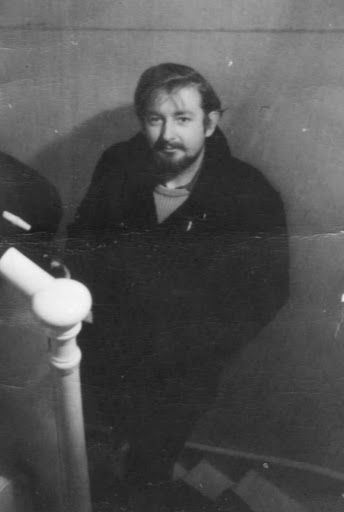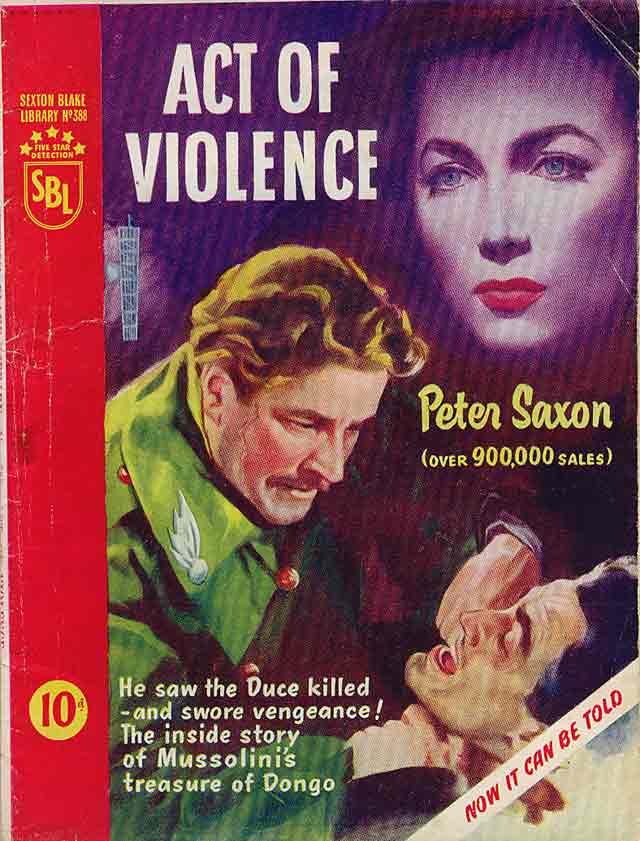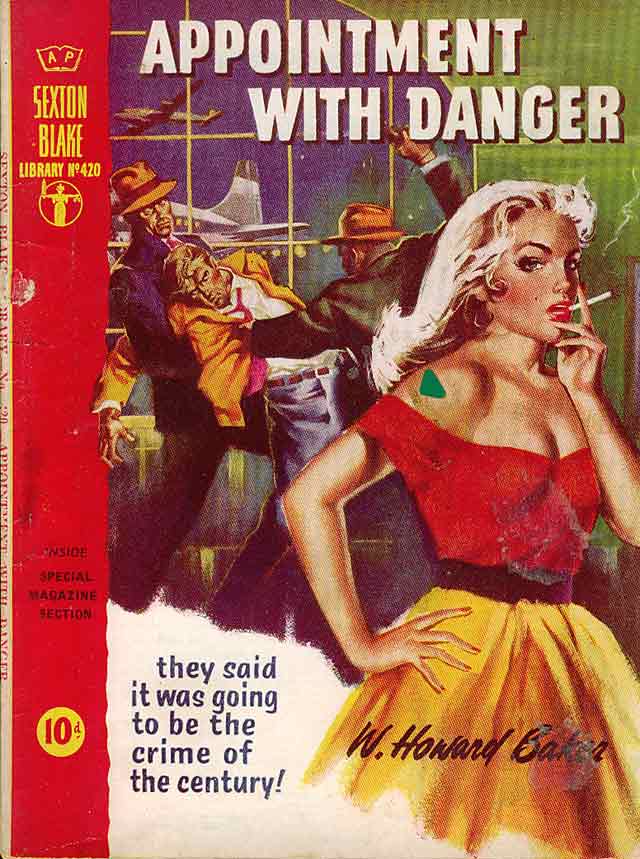Resident Rascal
by Michael Moorcock
 Was it Len Pratt, former editor of THE SEXTON BLAKE LIBRARY, who 'killed off' the old resident villains who frequently inhabited the Library up to the outbreak of the War?
Was it Len Pratt, former editor of THE SEXTON BLAKE LIBRARY, who 'killed off' the old resident villains who frequently inhabited the Library up to the outbreak of the War?
That is one thing, anyway, Editor Baker can't be blamed for, however much the 'die-hards' pan him for the innovations of 1956.
Naturally, working with him, I am biased towards W. Howard Baker's ideas of what the Library should be, and in all fairness he has often leaned over backwards to provide the 'die-hards' with what they want.
That's as may be, of course. The old favourites like Plummer, Rymer, Vali Mata-Vali, Mlle Roxane, Zenith, Waldo and the rest are no longer with us. They belong to a different era. They died with the birth of the Third and present series — but unfortunately, as far as I am concerned, nothing came to take their place until Howard Baker rejigged the Library and made it what it is today.
It was a bleak period for Blake between 1940 and 1956. WhenI was younger, I read the old UNION JACK stories with pleasure — and I like reading most of the New Era series; but try and make me read the intermediary stories! To my mind they're not worth the paper they're printed on!
As we asked once before, who will take their place? Is there room for some of the old characters in the current set-up? Or should they be allowed to remain as they are — gone but not forgotten?
 What about replacing them with villains who could fit more easily into the modern series? Michael Boland of ACT OF VIOLENCE and APPOINTMENT WITH DANGER is certainly a character who could stand beside George Marsden Plummer as a crook worthy of Blake's metal. And, of course, let's face it, he's far less stereotyped than Plummer. Then, there is Orlando Dante of DESIGN FOR VENGEANCE — the painter turned criminal. And, although Beulah de Courcy is hardly a crook, she is more inclined to walk on the opposite side of the fence to Blake than her equally glamorous cousin — or, for that matter, any of the present 'regulars.'
What about replacing them with villains who could fit more easily into the modern series? Michael Boland of ACT OF VIOLENCE and APPOINTMENT WITH DANGER is certainly a character who could stand beside George Marsden Plummer as a crook worthy of Blake's metal. And, of course, let's face it, he's far less stereotyped than Plummer. Then, there is Orlando Dante of DESIGN FOR VENGEANCE — the painter turned criminal. And, although Beulah de Courcy is hardly a crook, she is more inclined to walk on the opposite side of the fence to Blake than her equally glamorous cousin — or, for that matter, any of the present 'regulars.'
Personally, and here I am at a minor variance with my editor, I do not like the idea of the Syndicate — the world-wide organisation of crooks who have given Blake trouble in the past. A syndicate of this kind seems to me unrealistic. Whereas in almost all other respects the Blake Library is on a level which will appeal to the adult reader, the Syndicate strikes a jarring note.
Blake moves with the times. In the twenties and thirties, most detective fiction had its stock villains and much larger than life heroes. These days the approach the reader wants is inclined towards a more realistic hero and villain. This is not to say that to please our readers we have to sink to the level of the Hank Janson-type stories and their ilk (as some irate readers suggested we were doing when Blake first shifted sites to Berkeley Square), but on the other hand it is inconceivable that we return to the borderline fantasies of the pre-war period.
We have to please most of the people most of the time — the majority view must prevail.
If we did go to the opposite extreme and present overdoses of sex and sadism to the public — no doubt our circulation would rise startlingly among certain quarters. We don't want that — our publishers don't want that — and, what is most important, you, the readers don't want that.
Anyway, the S&S stuff is just as unrealistic and fantastic as its opposite. So, whether some of you dislike it or not, we have managed to strike a happy medium. We aim to please — but we cannot pander entirely to the minority. This pandering has been done in the past with other magazines — and I don't see those magazines on the bookstalls any more.
 Personally, I'm not fond of detective novels — I'm not over-keen on most novels which are obviously written to fit a genre (be it detective, science fiction, romance or historical) but I can take the occasional Fredric Brown, Simenon, Chesterton — or W. Howard Baker and Jack Trevor Story.
Personally, I'm not fond of detective novels — I'm not over-keen on most novels which are obviously written to fit a genre (be it detective, science fiction, romance or historical) but I can take the occasional Fredric Brown, Simenon, Chesterton — or W. Howard Baker and Jack Trevor Story.
Almost against my will I have read both the above-mentioned writers with pleasure. Both of them, of course, don't have to rely on the S.B.L. for a living (or upon the detective story, for that matter — they are both writers of not inconsiderable merit) but they do it because they like it. A story written for pleasure as well as profit by a good professional is superior to one written strictly for profit.
Detective fiction (like other genre fiction) is escapist literature. Sometimes it is good — sometimes it's appallingly bad. The best of Blake is good — and it can stand up to the best stuff published between hard-covers. But, at the risk of appearing snobbish, I can't regard it as anything but escapist fiction — and as such it should be regarded. To look at it in any other way would be foolish.
I like good escapist fiction.
Which brings us back, for some reason, to the Big Question. Who, and I repeat myself, is going to take their place?
Boland, Dante and de Courcy are logically the only ones currently in the running (though suggestions, I should think, would be eminently welcome at the Fleetway Offices).
When this comes out, there will certainly be another — probably our choice for resident villain (the idea stemmed from the rough draft of this article).
Story, Baker, and perhaps Maclean and Martin, are — again looking at things logically — the only writers who could present an acceptable resident rascal to the customers.
 And, for my money, it's Story who could do it the best. Story doesn't treat Blake seriously — indeed, some readers consider his irreverancies sheer, not to say unmitigated, blasphemy! Oh, Story approaches a new novel seriously enough — if he didn't, then his novels wouldn't come off with so many readers — but he doesn't treat the detective seriously — he shows us, in fact, Blake in his lighter moments (and makes Blake, necessarily, that much more human) ...
And, for my money, it's Story who could do it the best. Story doesn't treat Blake seriously — indeed, some readers consider his irreverancies sheer, not to say unmitigated, blasphemy! Oh, Story approaches a new novel seriously enough — if he didn't, then his novels wouldn't come off with so many readers — but he doesn't treat the detective seriously — he shows us, in fact, Blake in his lighter moments (and makes Blake, necessarily, that much more human) ...
Jack Trevor Story's novels often near the borders of Surrealism. Anything goes — and most does — so why shouldn't he be the innovator of a new stock villain? — someone in fact who takes his criminal activities lightly. Someone amoral — someone, perhaps, with the attitudes of our old friend Waldo 'The Wonderman' Conquest?
I can foresee the exciting possibilities even as I write. A gloriously unbelievable villain would be fine, looking at it from my own angle.
So what about it? Would you be prepared to have a humorous rascal as a resident villain? The idea appeals to me greatly — and to Jack Story to whom I have put it. Even now, things are moving in that direction, and the villain may well be established before we know it! But what do you think?
The above suggestion would, I believe, strike a happy medium — a good compromise.
Maybe those of you who are sufficiently interested could write to W. Howard Baker and say what you think. Remember, I'm not writing 'officially' here — and what you've just read is strictly my own opinion.
